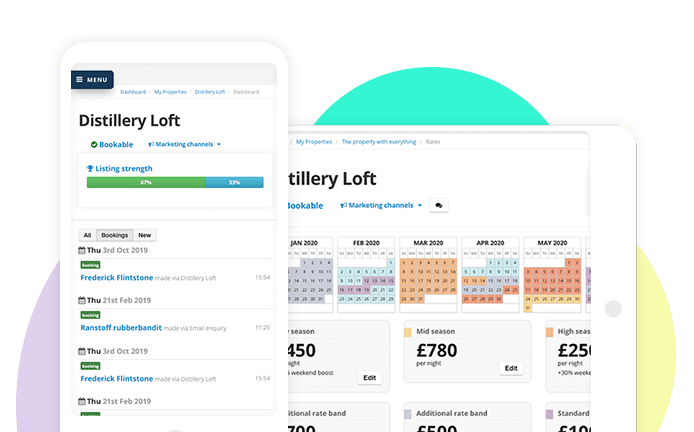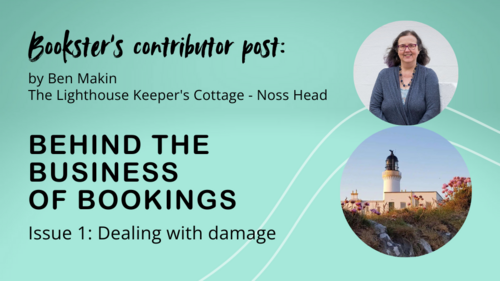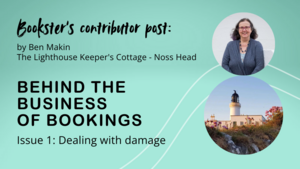Contributor post: How to reduce damage in holiday lets
3 minute read // updated
byKey Takeaways
- Ben welcomes guests to the Lighthouse Keepers Cottage in Noss Head
- How do you think about damage?
- Broken Windows Theory
- Minimising the impact
- Building a damage strategy
- Damage deposits and guest IDs

Welcome to the first edition of our contributor posts, inviting holiday rental professionals to share their experiences of working in this diverse and interesting sector.

My name is Ben, and I welcomed my first guests in 2018. I realised early on that damage is not just about the guest, it’s about the host as well.
How to reduce damage in my holiday let
Are you looking for ways to set up a damage deposit for your holiday let?
Do you want your direct bookings to be protected by a damage deposit and customer ID?
Bookster has these options, and here I look at how they can fit into a larger strategy for reducing the problems that damage causes to a short-term let.
My name is Ben, and I welcomed my first guests in 2018. I realised early on that damage is not just about the guest, it’s about the host as well.
How do you think about damage?
Here’s a quick quiz.
-
Is damage something random that guests do to your place? Do you take it personally? Does it reduce the profit you expect?
-
Or is it nothing personal? Is ‘wear and tear’ just another cost, like wages and utilities? Do you have a strategy to minimise and manage damage?
It is possible to reduce the amount of damage, and reduce the costs.
Part of the answer may be having a damage deposit and confirming the guest’s ID, both of which are things you can do in Bookster. But - don’t tell Bookster this! - they are not the whole solution!
‘Broken Windows Theory’ or ‘Prevention is Better than Cure’
‘Broken windows theory’ says that the more run-down somewhere is, the less people will respect it.
It works the other way too.
If your guests see that you respect your place, and you respect them, they are more likely to treat it well.
Maintain high standards
The first sentence in my cleaners’ manual says “make it look like a show home!”
We opted for painted walls because they are cheap and easy to refresh when needed.
It’s also why we have a monthly deep clean on top of our cleans between guests, and why we have the windows cleaned regularly.
If it’s bright and perfect, guests can see we care about the place, and that - yes - we will notice damage, and - yes - we will mind if they don’t treat it well.
Question for you
How can you make it easier to maintain your place with consistent high standards? (Ask your cleaners, if you can’t think of improvements yourself).
Guest-proof your place
We have coasters of course. But all our bedside tables and chests of drawers have custom cut acrylic tops to prevent watermarks and burns. I know it’s stopped at least one burn mark on the wood.
We’ve saved at least one mattress by protecting them. Each mattress has a bug-proof encasement, a waterproof mattress protector, and a soft mattress protector, all underneath the top sheet. We also put a throw on top of the duvet.
These make laundry much easier, so we can be truly kid- and dog-friendly. Some hosts opt for coloured bed-linen too.
Question for you: What quick hacks would help you make your place guest-proof, child-proof, and dog-proof?
Show guests you care, and help them to help you
Don't put notes everywhere! You don’t want your place on insta or tiktok with the hashtags #NaggingHost #ScareBnB.
We only have four friendly notes for guests (the loo, the sink, the recycling, and the beds). Less is more, and our notes are there to help, not nag.
On the other hand, I do show my guests I care. They can see that I haven’t just dumped any old bric-a-brac on the shelves, but have thought about the books, games and DVDs.
Our guest info pack tells them about the artists who created our pictures, and our locally made lamp-shades. They recognise the thought that’s gone into the place, and treat it thoughtfully in return.
Our guests can use our Henry and other cleaning equipment. Some do, some don’t, but a lot of our dog-owning guests leave the place cleaner than the ones without pets.
Question for you: How can you show your guests you care, and help them look after your place?
Minimise the impact of damage
Buy on Marketplace and Gumtree - but make sure items fit your style
It hurts less to replace a lower-cost pre-owned item than the same item bought brand new.
But choosing high quality means they’ll last and shows you care.
I’ve sourced some lovely stuff on Marketplace and Gumtree. Great curtains, a funky armchair, binoculars for bird-watching, painted bedside tables, robust antique farmhouse kitchen chairs.
I focus on quality, and only ever buy items that fit the style in the cottage.
Question for you: What replacement items could you get on Marketplace or Gumtree if you planned ahead a bit?
Don’t sweat the small stuff
Buy three sets of crockery and glasses, and put out two. Our crockery is from Ikea and our glasses come from supermarkets. Cheap as chips. Talking of which, replace plates the moment they chip - no broken windows, remember?
Learn how to remove the most common stains from bed-linen - it’s part of what we are paid to do. (While writing this I took some linen out of the washing machine. The stains I pre-treated had gone, but there was a biro in the machine! Literal black marks everywhere! So back to the soaking sink they’ve gone. Sometimes it really is me, and not the guests!)
Darwin talked about “survival of the fittest”. If it breaks, replace it with something stronger. Which is why we now have enamel bakeware, plastic plates for children, and an enamel dog bowl with our name on it.
Question for you: What changes can you make to reduce the damage drama?
Know when cheap is cheerful - and when it isn’t
You really need to understand your ideal guest for this. And understand the damage your specific guests might do.
-
Lower-cost coloured bed linen, that won’t last but is easy to replace? Or hotel quality white cotton, that will last forever but show stains? --- Do you accept dogs? Are your guests likely to use self-tan products?
-
Lower cost carpet, that is cheap to replace if there is a red wine disaster? Or high quality carpet that will last forever and that’s treated to resist stains? Do you host larger groups including young people? Or older couples?
-
Ikea 365 for replaceability, or Denby for quality and style? Do you host larger families with young kids, or older people looking for a more cottagey stay?
Question for you: When something breaks, will you go cheaper to reduce the pain? Or more robust to stop it happening twice?
Build a ‘damage strategy’ into your business model
We’ve looked at damage in your place. But how do you manage it within your business? This is the stuff that many people miss.
Check your insurance
Your holiday-let insurance should cover damage by guests, and it should include legal expenses cover. So you may not be as exposed as you think you are.
Question for you: What is the excess on your insurance? What proof do they need that something is damaged and not just old?
Accounting for damage
We all know that cars depreciate and their value goes down year-on-year. Your other assets do too.
Your accountant should depreciate your assets each year to reduce your tax bill. Use the cost of depreciation as the starting point to budget for replacements.
Question for you: When your accountant looks at your books, what do they recommend you budget for repairs and replacements each year?
Planned and unplanned replacements
No-one wants to keep 20% of the cost of everything you own in the bank. But everyone should schedule upgrades and replacements.
Some come out of the blue - our fridge broke at random last summer - and others you can plan for, like carpets, furniture and bedding.
Having a budget and a plan means you don’t panic when something major breaks, you just re-prioritise your plan.
And scheduling new decor stops your place looking tatty and dated.
Question for you: Does your maintenance schedule include repairs and replacements?
Damage Deposits and Guest IDs
We’ve looked at how to reduce damage and manage it when it happens. But what about claiming costs back from guests?
One of the benefits of Airbnb is that you can choose to only take guests who have confirmed their ID.
You can do this with Bookster too.
And if you want damage deposits to cover minor breakages or the excess on your insurance, Bookster can charge and refund them automatically.
Their value to you depends on your overall damage strategy, and your ideal guest.
Damage deposit and guest ID pros and cons
Pros
- Paying a damage deposit focuses the guests’ mind on taking care
- It is easy to claim back money, including extra payments like EV charging
- Damage deposits are collected and returned automatically
- The guest ID means you really do know who is staying with you
Cons
- Guests may be put off, thinking you want to charge them for the least little thing
- You must spot any damage immediately, and you need the admin time to contact the guest and charge them
- You need to reconcile the payments into and out of your bank account and pay the transaction fees.
- The ID process may slow down the booking journey, and some guests won’t want the extra effort.
Should you set up a damage deposit in your holiday let?
So you’ve read this post and made some changes to reduce the damage that guests do. Are a damage deposit and guest ID scheme right for you?
I have some final questions! And hopefully these will guide you to the answer that’s right for you!
Is my damage deposit there to tell guests to be careful? Or do I expect to claim money back?
Know why you are doing it, and check to see if it’s working for you.
What is the threshold for charging to the guest?
A tenner for a new towel? £100 quid towards a carpet you were going to replace anyway? £250 to repair the barbecue burns on your brand new wooden decking?
Will it put them off rebooking? Or affect their review? What about your admin costs in terms of time and aggro?
Decide what you’ll charge for and what you are happy to let go.
What’s my annual budget for replacements, repairs, maintenance and improvements?
Discuss this with your accountant. When you know your budget and schedule and you look back at previous guests, you may decide you need a damage deposit to bridge the gaps, or you may decide it’s not worth the book-keeping admin.
And above all ask yourself, if this puts guests off booking - will I lose money? Or will I save more money by claiming losses back?
Only you know your business and your guests. Only you can answer this!
Every business is different. I think it’s great these tools are here in Bookster to help you run your business in a way that works for you.
About Ben
My name is Ben, and I love welcoming guests to my holiday cottage at Noss Head Lighthouse in Caithness.
I have been a Bookster customer since the day I launched my website in 2018. I work hard to discourage damage, but I avoid drama when it happens. Because it happens to all of us.
These words are mine, and not written by AI. I have not been paid to write this: I am glad to have the chance to reach a new audience with my thoughts on running a holiday cottage as a business.
For more on my holiday cottage, check out my blog, or sign up for my newsletter.
This is part of a series of contributor posts by holiday rental professionals, sharing experiences and expertise.
Ben is a professional holiday rental owner, with Lighthouse Keepers Cottage in Noss Head.

